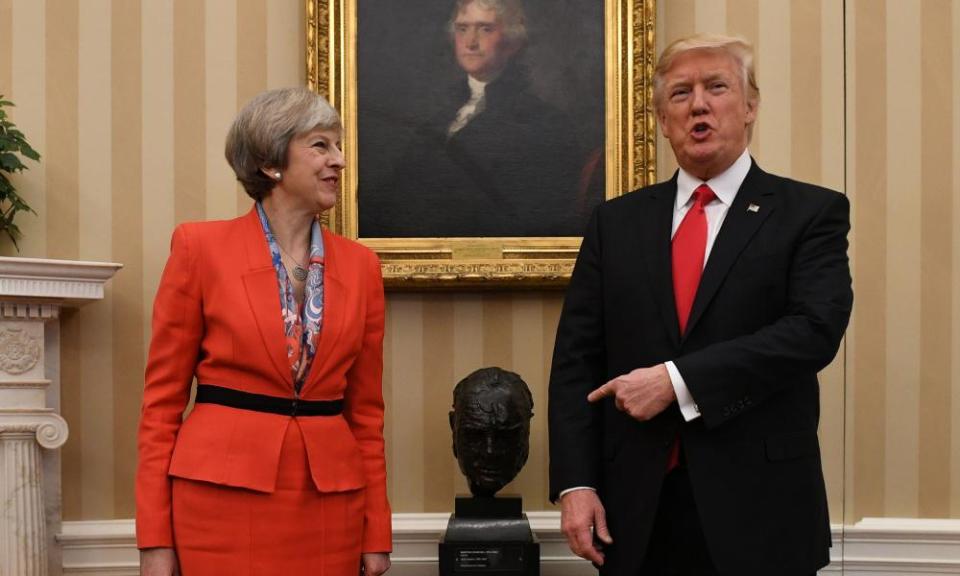Donald Trump's London visit still uncertain after call with May as tensions continue
Pair have disagreed over Jerusalem and Trump’s Islamophobic retweets
Neither US nor UK mention visit in accounts of phone call

Theresa May spoke to Donald Trump on Tuesday about their country’s very different positions on Jerusalem, but it was left unclear whether previous damage to the relationship had been repaired – or whether the president would visit London in February to open the new US embassy.
The call between the two leaders came 13 days after May had announced she would speak to Trump about his decision to recognise Jerusalem as the capital of Israel, a position at odds with the policy pursued by London and almost all other UN member states, which argue that the fate of the city should be decided in comprehensive negotiations.
Asked if the two-week delay amounted to a snub by Trump, a spokesman for May said the pair had “a good relationship”, which included being able to differ on some matters.
“The prime minister has always been clear on these matters that part of having a special relationship is that where there are times you don’t agree, you can say so,” the spokesman said.
However, there is still no agreement on a Trump visit to the UK, which had been postponed because of fears that it would trigger mass demonstrations. British officials say that ultimately Trump will have to decide whether to make the trip, given that large-scale demonstrations against him are planned, and that it would not be possible to stage-manage a visit to London, unlike during Trump’s previous trips to Riyadh, Jerusalem, Warsaw and Beijing.
The US ambassador to the UK, Woody Johnson, a personal friend of Trump, said last week he expected the president to visit London in the new year, raising expectations that he would fly in to open a new $800m embassy complex in Battersea on the south bank of the Thames. However, neither the Downing Street nor the White House account of Monday’s call mentioned a presidential visit.
A later statement from Downing Street said that May had offered condolences for Monday’s train crash in Washington state and that they had “discussed the different positions we took on the recognition of Jerusalem as the Israeli capital, and agreed on the importance of the US bringing forward new proposals for peace and the international community supporting these efforts”.
The issue of Jerusalem has isolated Washington from almost all its allies, and forced a rare US veto of a UN security council resolution on Monday, when the 14 other council members, including the UK, voted to call for the US recognition of its status as Israeli capital be rescinded.
The vote drew a bitter response from the US envoy to the UN, Nikki Haley, who described it as an “insult”, adding: “It won’t be forgotten.” In an official transcript of her remarks issued on Tuesday, however, the line about the vote not being forgotten was left out. The White House account of the president’s conversation with May did not mention Jerusalem.
The open rift over Jerusalem followed a sharp exchange between May and Trump after the president retweeted Islamophobic videos circulated by the extreme-right Britain First group, which was banned from Twitter this week. The prime minister publicly rebuked Trump, saying he had been “wrong” to share the videos, which drew a sour tweeted riposte from the president telling her not to focus on him but on what was happening in the UK.
A spokesman for Labour leader Jeremy Corbyn said: “It has taken Theresa May two weeks to contact Trump over his dangerous decision to recognise Jerusalem as Israel’s capital, yet she seems to have failed to use the opportunity to call him out for retweeting abhorrent Islamophobic material. As Prime Minister, May has a responsibility to stand up against hate and for all communities in our country.”.
The No 10 communique on Tuesday’s phone call said the two leaders also discussed the situation in Yemen, and that May had expressed “our ongoing deep concerns at the humanitarian situation”.
A Saudi-led coalition supported by both countries is conducting an aerial bombing campaign and a blockade of rebel-held areas that has contributed significantly to a humanitarian disaster. May has called for an end to the blockade, but British officials acknowledge that Trump has far greater leverage on the Saudi crown prince, Mohammed bin Salman, with whom the president and his son-in-law, Jared Kushner, have a close relationship.
Trump issued a brief statement on 6 December, saying he had asked US officials to ask Riyadh to allow food, fuel and water and medicine to reach Yemeni ports, but he has not put overt pressure on Salman on the issue.
Downing Street said May reported on progress in Brexit talks and the president and prime minister “wished each other a very Merry Christmas and looked forward to keeping in close touch”.
The White House press secretary, Sarah Sanders, said discussions with London about the visit were continuing.
“We are working with them to finalise the details, which we expect to announce soon,” Sanders said.

